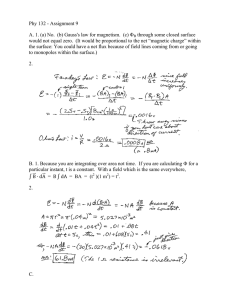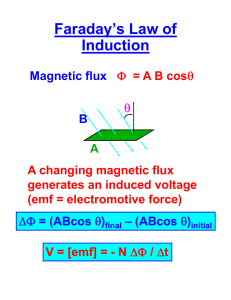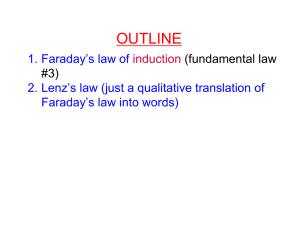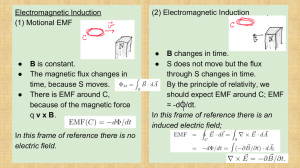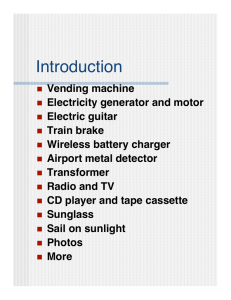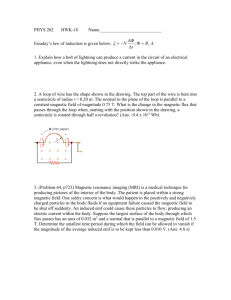Measuring gravity using Electromagnetic Induction
advertisement
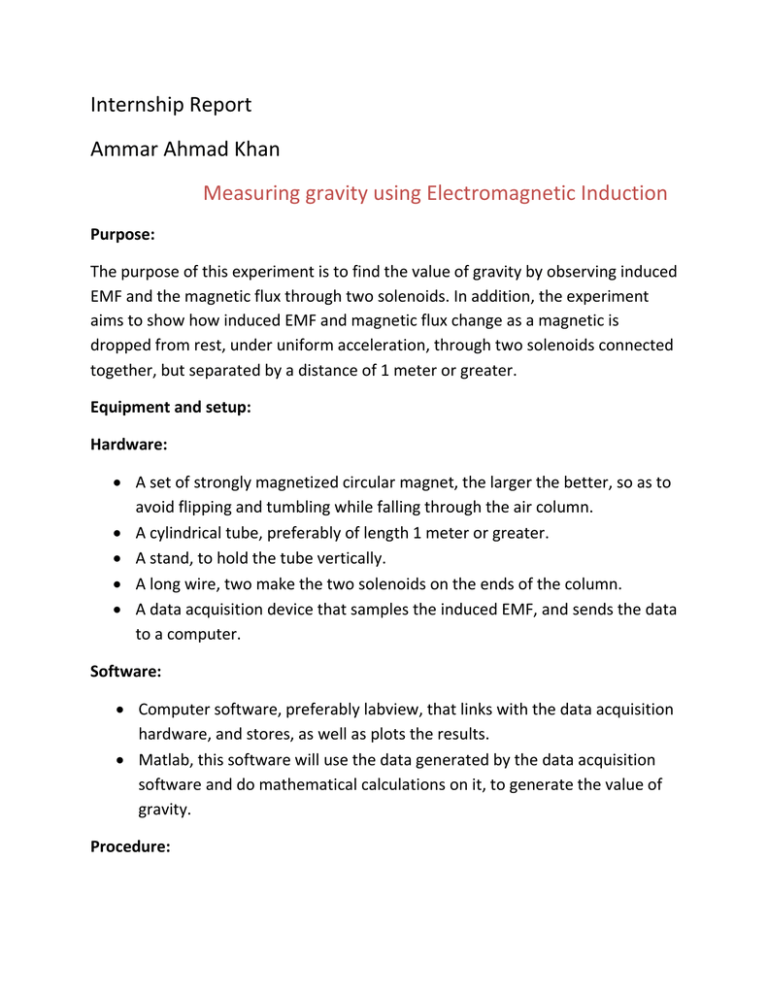
Internship Report Ammar Ahmad Khan Measuring gravity using Electromagnetic Induction Purpose: The purpose of this experiment is to find the value of gravity by observing induced EMF and the magnetic flux through two solenoids. In addition, the experiment aims to show how induced EMF and magnetic flux change as a magnetic is dropped from rest, under uniform acceleration, through two solenoids connected together, but separated by a distance of 1 meter or greater. Equipment and setup: Hardware: A set of strongly magnetized circular magnet, the larger the better, so as to avoid flipping and tumbling while falling through the air column. A cylindrical tube, preferably of length 1 meter or greater. A stand, to hold the tube vertically. A long wire, two make the two solenoids on the ends of the column. A data acquisition device that samples the induced EMF, and sends the data to a computer. Software: Computer software, preferably labview, that links with the data acquisition hardware, and stores, as well as plots the results. Matlab, this software will use the data generated by the data acquisition software and do mathematical calculations on it, to generate the value of gravity. Procedure: Make two solenoids on the ends of the vertical column, with a minimum of ten turns each. The two coils should have one side connected to each other. Set the column on the stand; connect one coil to the positive terminal of the data acquisition device and the other to the ground of the device. You should now be ready to conduct the experiment. Run the simulation on the software, place the magnet at eh top of the column and drop it. Once the reading has been made, you can view the graphs generated and calculate the value of gravity manually, or use the program on Matlab to do the work for you. The principle formula being used here is: S= u*t + 0.5 * G*t2 S: the distance between the top of the first coil, and the middle of the second coil. t : time between the rise of the first waveform, and the middle of the second waveform u : initial velocity, this is set to zero, as the magnet is dropped from rest. G : the value of gravity, that is being measured Either the value of G can be found by applying this formula directly, and using the plots of the waveforms to find the time intervals between the two magnets, or a program made on Matlab can be used, it is suggested to do both, as it will aid in the understanding of the experiment. Interesting observations: It is interesting to note that as can be seen from a graph of the magnetic flux, and that of the induced EMF, the magnetic flux has a maximum value at the same time at which the EMF is zero. This can be explained by observing that the magnetic flux must be maximum in the middle of the coil, and at this point the rate of change of magnetic flux is zero, hence we see a minima in the induced EMF curve. In an experiment performed with a single solenoid only, we can see from the graphs, that at the time t=4 s the magnetic flux is maximum, where as the induced EMF is zero, the graph is shown below: Note: The graphs shown above are generated from an experiment conducted from a single solenoid, hence only one peak is seen for both the induced EMF and the magnetic flux, this was illustrative purposes only, and the actual experiment should be performed with two solenoids on a long column, as instructed above. Sample graphs of induced EMF and magnetic flux are shown below, from a particular experiment: Emf: A close-up of the peaks is shown below: Graphs of magnetic flux: A close up of the graph: Results of an experiment consisting of 10 trials are shown below: Trial no. 1 2 3 4 5 6 7 8 9 10 Gravity m/s2 9.9716 9.8739 9.9755 9.8831 9.8396 9.9014 9.7408 9.9114 9.7543 9.8815 Mean gravity = 9.89m/s2 Standard Deviation =0.07 A different setup: A different setup, to calculate the value of gravity, and to learn about induced EMF and magnetic flux, is to use five solenoids wound on a column rather than the two used earlier. The five solenoids should be connected together, and the results should be seen on the computer using the software and methods stated previously. This experiment allows for the calculation of 4 values of gravity in each trial, adding accuracy to the results, as an average can also be taken. The time is always taken from the start of the first waveform, to the middle of the other waveform. The distances between the coils is measured, and the value of gravity is calculated. The apparatus: The five solenoids should be wound on a column. The solenoids are be separated from each other by at least 30cm. All the solenoids have the same number of turns, ideally more than 15 turns. Results of a sample experiment: This experiment allows for the calculation of 4 values of gravity in each trial, adding accuracy to the results, as an average can also be taken. The waveforms of EMF: Results: Trial Between coil 1-2 Between coil 1-3 Between coil 1-4 Between coil 1-5 Distance cm 30 62 108 124 Velocity m/s 2.35 3.44 4.53 5.2 Gravity m/s2 9.23 9.54 9.5 9.43
